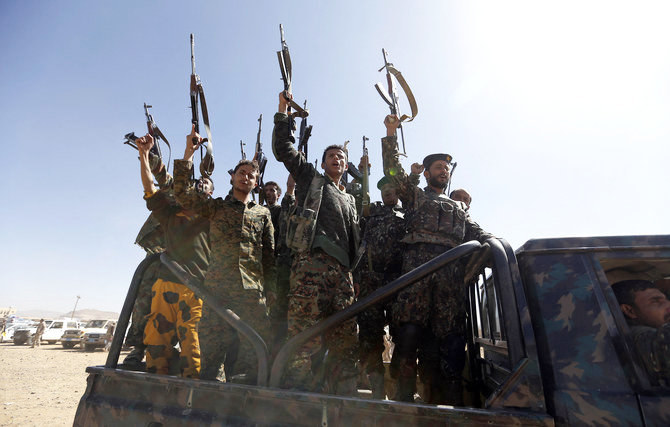AL-MUKALLA: Several artillery shells fired by the Houthis hit the city of Taiz in Yemen on Tuesday, as international mediators, envoys and aid organizations intensified their efforts to convince the two sides to renew a UN-brokered truce.
Residents and officials in Taiz said several explosions, caused by Houthi artillery, rocked eastern parts of the city. The attack is the latest in a series of violations of the UN-brokered truce, according to Yemeni officials.
Abdul Basit Al-Baher, a Yemeni military officer in Taiz, told Arab News that a Houthi sniper targeted a civilian in the same eastern area of the city, as the militia’s tanks and other heavy artillery pounded residential areas.
“The Houthi heavy fire and sniper attacks have not stopped during the truce,” he said, adding that the militia recently deployed more snipers and created new military posts. “People did not go to mosques during last Friday’s prayers out of fear of being hit by Houthi snipers.”
The Houthis have been in control of the outskirts of Taiz for seven years and have imposed a choking siege that has pushed thousands of people into famine.
As part of the truce, discussions between the Yemeni government and the Houthis in Amman about the opening of roads in Taiz have so far failed to produce any results. A new round of talks between the two sides will take place on Wednesday, a member of the Yemeni government delegation told Arab News.
Al-Baher said people in Taiz are not supportive of a renewal of the truce because it has failed to result in the lifting of the siege.
“We did not benefit from the truce. The Houthi shelling, mobilization of forces and military operations have not ceased during the truce,” he said.
During the past seven days, people in Taiz have intensified their protests and campaigns to draw attention to the effects of the siege and put pressure on the Yemeni negotiators in Amman to end it.
The two-month truce, which came into effect on April 2, led to a significant reduction in fighting and fatalities, the resumption of commercial flights from Sanaa, and at least 12 ships carrying fuel have been able to enter Hodeidah.
The latest Houthi mortar attack on Taiz came as the UN envoy for Yemen, Hans Grundberg, Western diplomats and aid organizations stepped up the pressure on the Yemeni government and the Houthis to renew the truce.
On Tuesday, dozens of international organizations wrote a joint letter to the two sides, urging them to extend the truce in June to avoid more civilian casualties.
“We, the undersigned agencies, urge you to extend the truce agreement, build further on the gains you have made possible over the past two months, and work toward peace for the people of Yemen,” they said in the letter.
It added that the truce has had positive humanitarian effects, including a reduction in casualties by 50 percent. It has also addressed fuel shortages and allowed patients to travel to receive medical attention outside the country.
“The gift of a better life for the people of Yemen is in your hands. Don’t let June be the month where fighting resumes, public services fail and more innocent lives are lost,” the letter said.
A group of European ambassadors to Yemen arrived in the port city of Aden and met government officials to express their support for the Presidential Leadership Council and call for an end to the siege of Taiz, said Ahmed Awadh bin Mubarak, Yemen’s foreign minister.
In Muscat, meanwhile, Grundberg discussed with the chief negotiator for the Houthis, Mohammed Abdul Salam, and Omani officials the possibility of opening roads in Taiz, renewing the truce and working to achieve a peace settlement to end the war, according to the UN envoy’s office.
He discussed the same topics with Rashad Al-Alimi, the head of the Presidential Leadership Council, and his government in Aden on Monday. Grundberg noted that renewing the truce is “critical to solidify benefits delivered so far and provide space to move toward a political settlement.”
Linda Thomas-Greenfield, the permanent US representative to the UN, said that her country had been encouraged early on by efforts to move the truce forward and come up with “confidence-building measures that would allow for humanitarian assistance to move to the people of Yemen.”
But now the negotiations seem “troublesome to us,” she told reporters in New York. However, she noted that the “talks haven’t ended yet and we encourage the parties on both sides to continue those efforts and find a peaceful way to provide the needed humanitarian assistance to the people of Yemen.”
UN Secretary General Antonio Guterres called Al-Alimi to discuss the implementation of the truce, as well as the latest security developments in the war-ravaged country. During the conversation the UN chief stressed the need to extend and “fully implement all the elements of the renewable, two-month nationwide truce.”
He also underscored the “critical role of the truce in addressing some of the most immediate humanitarian and economic needs to alleviate the suffering of the Yemeni people, including facilitating the freedom of movement of people and goods to, from and across Yemen,” according to Stephane Dujarric, the spokesperson for the secretary-general.
- Additional reporting by Ephrem Kossaify in New York



























